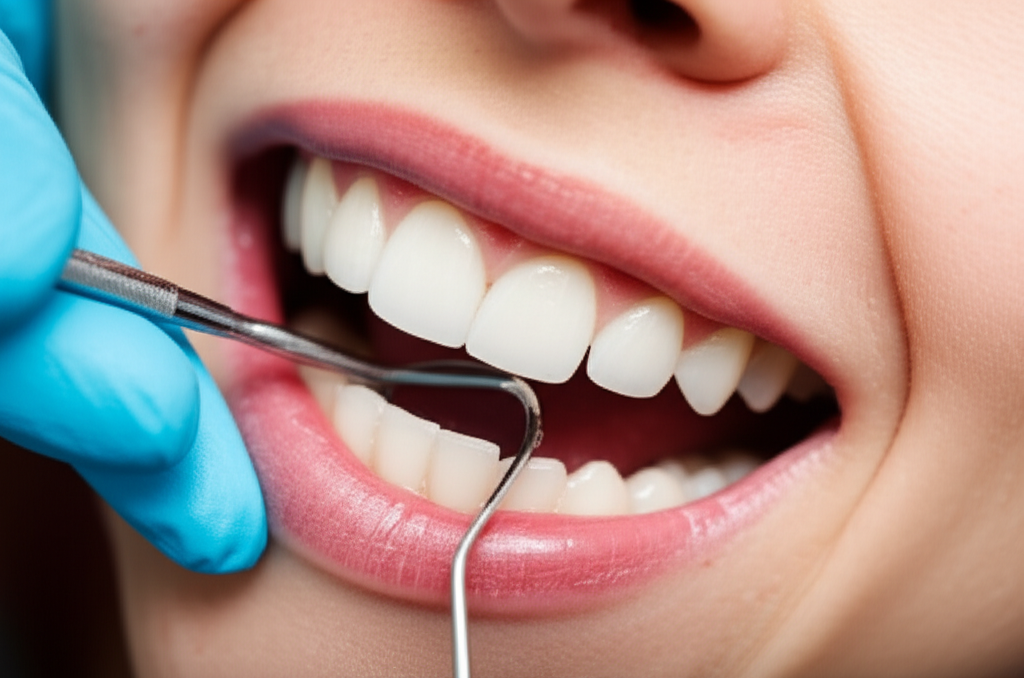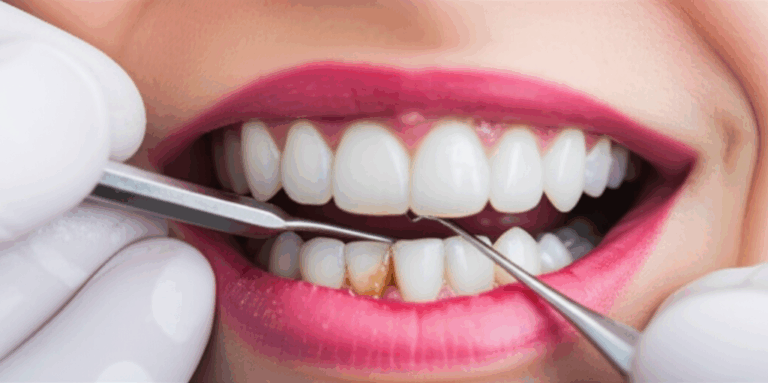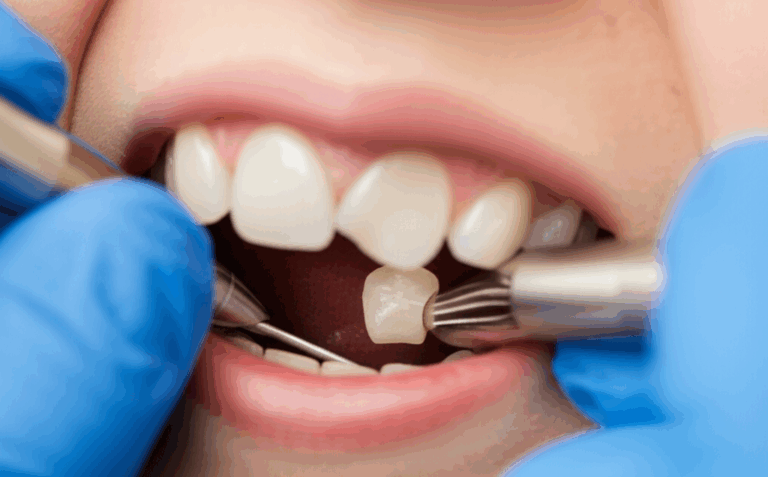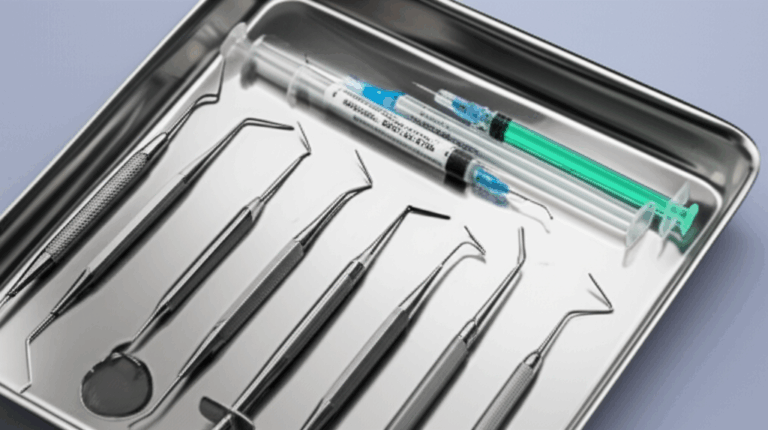
Can a Dentist Fix a Chipped Front Tooth? Your Complete Guide to Repair Options
Ever chipped your front tooth and wondered, “Can a dentist really fix it?” The answer is yes! In this guide, you’ll find out exactly how dentists repair chipped front teeth, what kinds of treatments work best, how much repairs might cost, and what you can do to keep your smile looking great. Teeth chips happen to a lot of people, but there are modern solutions to restore your confidence quickly and easily.
Table of Contents
Why Do Front Teeth Chip?
Let me ask you—have you ever bitten down on a hard candy, ice cube, or even a pencil, and suddenly felt something sharp in your mouth? That’s how a lot of people notice a chipped tooth. There are many ways teeth can chip, such as:
- Getting hit during sports or an accident (trauma)
- Chewing hard foods (candy, popcorn, or ice)
- Using your teeth to open things (not a great idea!)
- Grinding your teeth at night (called bruxism)
- Old fillings or tooth decay that make the tooth weaker
The truth is, our front teeth are especially at risk because they’re used so often and are right up front where any little accident can snag them.
How Serious Is Your Chipped Tooth?
All chips aren’t the same. Some are just tiny pieces that barely catch your tongue, but others can be big breaks that make your whole tooth feel sore or sensitive.
Types of Chips:
- Small Chip (Enamel Only): Usually just a looks problem and not very painful.
- Medium Chip (Enamel and Dentin): Might cause some sensitivity and a more obvious crack.
- Large Chip/Break (Near or Into the Pulp): Might cause pain, bleeding, or chance of infection—often an emergency.
Pain or sensitivity isn’t just annoying. If you leave a chip alone, food or germs can get in, causing infection or even more damage.
What Should You Do First If You Chip a Tooth?
Picture this—you’ve just chipped your front tooth. It looks odd, might feel sharp, and maybe it hurts. What now?
If the damage is small, you’re probably safe to see the dentist soon. If you’re bleeding, have really bad pain, or can’t talk or eat, go see an emergency dentist fast!
Can a Dentist Fix a Chipped Front Tooth?
Absolutely! Dentists fix chipped front teeth every day. That’s part of their job as experts in dental injuries and restorative dentistry.
The best repair depends on:
- How big is the chip?
- Is the nerve showing?
- Do you want a quick fix or something that looks totally natural?
With new techniques, most chips can be fixed so well that nobody (except you and your dentist) will even know it happened.
What Are the Most Common Repair Options?
Dentists have several ways to fix chipped front teeth. Let’s look at the main kinds:
Dental Bonding (Composite Bonding)
This method uses a tooth-colored filling. The dentist shapes it to fill in the chip and hardens it with a special light. Bonding is:
- Good for: Small to medium chips, fast fixes, kids, and teens
- Pros: Quick, painless, looks real, less expensive
- Cons: Can stain after a while, not as strong as some other options
Porcelain Veneers
Veneers are thin, hard covers made from porcelain that fit right over the front of your tooth. They are made in a veneer lab just for you.
- Good for: Bigger chips, several chipped teeth, people wanting a really nice smile
- Pros: Strong, stays white, looks very real
- Cons: More expensive, takes more than one visit
Dental Crowns
A dental crown, also called a “cap,” covers the whole tooth. If your tooth is really broken, a crown gives strong protection.
- Good for: Large chips, broken teeth, after a root canal
- Pros: Very strong, lasts a long time
- Cons: More tooth needs to be trimmed, costs more
Table: Comparing Chipped Tooth Repair Options
| Repair Option | Good For | Cost Range (per tooth) | How Long It Lasts | Looks Real? |
|---|---|---|---|---|
| Dental Bonding | Small/medium chips | $200 – $600 | 5-10 years | Yes |
| Porcelain Veneers | Medium/large chips | $900 – $2,500 | 10-15+ years | Very |
| Dental Crowns | Big chips/broken teeth | $800 – $3,000+ | 10-20+ years | Yes |
How Does the Dental Repair Process Work?
You might wonder what really happens at the dentist’s when you repair a chipped tooth. Here’s how it usually goes:
1. Exam and Diagnosis
Your dentist will first check the tooth, maybe with X-rays, to see how deep the chip is. They’ll ask about any pain or sensitivity.
2. Preparation
For small chips, you might not need any numbing. For bigger repairs (like veneers or crowns), the tooth may need to be trimmed and numbing used.
3. The Repair
- Bonding: The dentist puts on the filling and shapes it, then hardens it with a blue light.
- Veneers/Crowns: The dentist will take an impression, send it to a china dental lab, and give you a temporary cover until your custom veneer or crown is ready.
4. Finishing Touches
After fitting, your dentist will polish the new tooth so it matches your other teeth well.
5. Care Tips
You’ll get advice to avoid hard foods, keep good brushing, and visit your dentist often.
What Will It Cost to Repair a Chipped Tooth?
Costs for fixing a chipped tooth can vary a lot, depending on the treatment and where you live.
What Changes the Cost?
- Type of repair: Bonding is cheapest, crowns cost the most.
- How bad the break is: Bigger chips cost more.
- Dentist fees and location: Dentists in big cities often cost more.
- Insurance coverage: Some repairs are called “cosmetic” and might not be covered.
General Price Ranges
| Treatment | Average Cost (per tooth) |
|---|---|
| Dental Bonding | $200 – $600 |
| Porcelain Veneer | $900 – $2,500 |
| Dental Crown | $800 – $3,000+ |
Check your insurance or talk to your dentist about ways to pay. Many offices will help you with the cost.
How Long Will the Repair Last?
Here’s what most people want to know: “If I fix my tooth, will it stay fixed?”
- Dental bonding: Good for 5-10 years with good care
- Porcelain veneers: Can last 10-15 years or more
- Crowns: Often last 10-20 years, sometimes longer
Taking care of your teeth is key. Brush and floss every day, avoid chewing hard things, and go to the dentist for checkups. If you grind your teeth, a night guard can help protect your teeth.
Is Fixing a Chipped Tooth Painful?
You might worry about pain. Here’s the real story: most chipped tooth repairs are easy and do not hurt.
- Dental bonding: Usually no numbing needed
- Veneers/crowns: A bit more involved, but numbing medicine keeps you comfy
If the nerve’s showing, your dentist might need to do a root canal first. But don’t worry—dentists today want to keep you as comfortable as possible.
Can Chipped Teeth Cause Other Problems?
If you ignore a chipped tooth, you can have some trouble:
- Sharp edges can cut your tongue or lips
- Sensitivity from the inside of the tooth can make hot or cold stuff hurt
- Cavities can start in the crack
- Infection may happen if germs reach the inside of the tooth (the pulp)
- Talking problems if the chip is on a front tooth
The point—fix the chip early. Waiting too long can mean a bigger problem and higher cost.
How Can You Prevent Future Chips?
Once your tooth is fixed, you’ll want to protect it! Here’s how:
- Don’t chew ice, popcorn kernels, or hard candy.
- Don’t use your teeth to open things.
- If you grind your teeth, wear a night guard at night.
- Eat healthy and brush twice a day with fluoride toothpaste.
- See your dentist every six months.
- Play sports? Wear a mouthguard.
Regular care means you protect your fix and all your teeth, too.
Should You Choose Bonding, Veneers, or Crowns?
You might wonder: “Which is best for me?” Here’s some help.
- Pick bonding for small chips, quick fixes, or kids and teens
- Pick veneers if you have medium chips, want a perfect smile, or have more than one chipped tooth
- Pick crowns if your tooth is really broken, very sensitive, or already has lots of fillings
Your dentist will help you choose based on the cost, the look you want, and how strong the fix needs to be. Sometimes, new dental options like zirconia lab choices offer even longer-lasting, really nice looking repairs.
When Is a Chipped Tooth a Dental Emergency?
Not sure if you should call your dentist now? Here are some signs you need help quick:
- Really bad pain or sensitivity
- Nerve showing (dark spot or bleeding inside the tooth)
- Can’t eat or talk well
- Big crack or lots missing
If it’s just a small chip and doesn’t hurt, it’s okay to wait a day or two. But don’t wait for weeks—the crack can get bigger and even get infected.
Which Dentist or Lab Is Right for You?
Not all dental offices or labs are the same. Some use advanced digital dental lab tools for fast and careful repairs. Look for a dentist who:
- Has a lot of experience with fixing smiles
- Works with labs that know chipped tooth repairs
- Can show you before and after pictures
- Tells you everything about the plan and the cost
Remember, good materials and skilled labs mean better looks, fixes that last longer, and more confidence for you.
Summary – Keep Smiling With Confidence!
Let’s finish with the most important things you should know:
- Chipped front teeth are common and can be fixed.
- Dentists use bonding, veneers, or crowns to fix chips, based on how bad the damage is.
- Quick action stops bigger problems like pain, infection, or larger cracks.
- Fixes can look totally natural, boost your confidence, and last a long time if you care for them.
- Pick your dentist and lab carefully for the best results.
- Keep up good habits to avoid more chips!
Don’t let a chipped tooth steal your smile. Make an appointment with your dentist and see how quick and easy it can be to fix your tooth and your confidence.
Key Takeaways:
- Chipped teeth happen to lots of people, especially the front ones.
- Quick dentist visits and new materials (like tooth-colored fillings, porcelain veneers, and crowns) make repairs fast and look natural.
- Small chips often need bonding; bigger chips may need veneers or crowns.
- Good dental labs and technology mean better, longer-lasting fixes.
- Take care of your teeth—don’t use them as tools, avoid hard foods, and wear protection for sports or grinding.
- Your smile can look as good as new—don’t wait to get help!
References:
This easy-to-read article was written for anyone looking to turn a chipped front tooth problem into a brand new smile. Visit your dentist and take charge of your dental health today!








